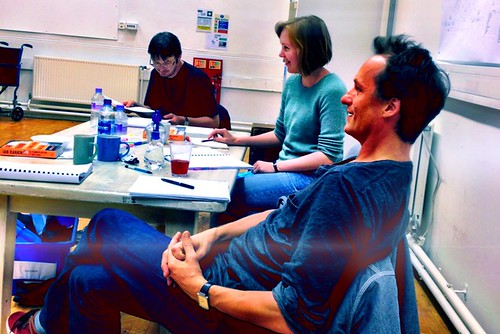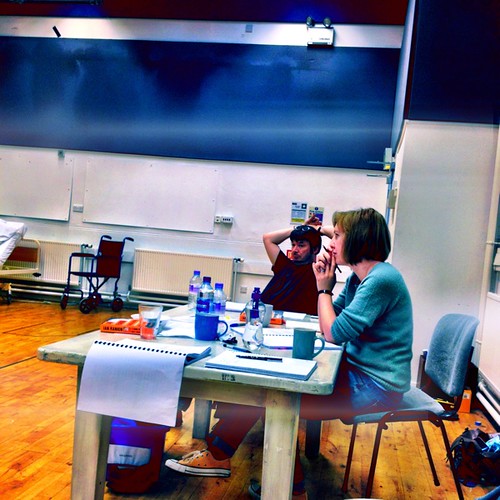The Dark Road Rushes – Two
Getting to know you: Week one on the Royal Lyceum’s Dark Road.
The second rehearsal-room blog from Jo Rush, AD on Dark Road, the collaboration between crime writer Ian Rankin and Lyceum artistic director Mark Thomson.
By Jo Rush
After the months of waiting, somehow the first week of rehearsals for Dark Road has already sped by and it’s suddenly September already.
We’ve had a brilliant week of getting to know each other and getting to grips with the complexities of the script. And it all began with day one and our first impressions.
You can never recreate a first impression. When working with a script the first reaction you have on reading it is often the closest you can get to what the audience will eventually experience so it’s really important to pay attention to these impressions and ideas before becoming too familiar with the play.
We spent the first day and a half of our rehearsals going through the play scene by scene and seeing what questions were raised at the end of each scene. This was really valuable time for all of us as the crime thriller genre demands a clarity of storyline and plotting that we had to ensure made sense.
We were lucky enough to have Ian Rankin present in rehearsals with us for the whole of last week before he jetted off to a book festival in South Africa. Ian has been a great help whenever clarification of the story has been needed, particularly of unseen or secret parts of the plot that never appear on stage. And it’s been really enjoyable to get an insight into his first impressions of rehearsing a stage play; being surprised by how many questions the actors asked and the different storytelling tools available in plays compared to novels.
“There’s all these internal things going on that you can write in a novel but you don’t have them on stage.” – Ian Rankin
Ian and I have both been figuring out the best way to contribute in the rehearsal room. As assistant director there is no hard and fast rule to define my role in the rehearsal process; I’m there to support the director in whatever way is needed, which necessarily changes depending on the director you’re working with. Ian, as a co-writer, and especially one who is so working closely with the play’s director, is in a similar position.
Some writers are never in rehearsal, others choose to be there all day, everyday and involved in every decision about the play. Ian has been striking a great balance between the two: finding the right time to give rewrites, not interrupting the flow of rehearsals, but there to provide help and clarity when needed. As a result, the cast have felt really encouraged by his supportive attitude and “benevolent presence” in the room and have felt able to voice any questions they have, which is key to the next phase of rehearsals we entered into.
Asking the right questions – actually just asking any questions no matter how silly they may sometimes sound – is vital in the first week of rehearsals. You have to throw ideas around and play with a lot of different possible meanings without landing on answers at this early stage. It’s as simple as just trying stuff out and using a process of elimination – every idea you reject gets you closer to the right answer.
“Can you do it like Dennis Hopper in Apocalypse Now?” – Mark Thomson (to young *female* actor).
Because of this, lots of suggestions get thrown out there that are designed to help the actors explore what subtext is underlying each scene and from that point to see how much it’s actually possible to play.
You may decide that a character has a chronic fear of light switches due to an electric shock received at their 3rd birthday party but can you play that without having to just tell the audience? Or do you just show that they never switch on the lights? Sometimes actually all you can play is what’s written, what the characters say or do. But you have to ask questions first before you can know this for sure.
One of the more hilarious suggestions we encountered this week was whether or not our heroine would have a ‘vajazzle’ – we quickly decided that of course she wouldn’t – but not before an awkward conversation where the exact definition of a ‘vajazzle’ had to be explained to Mark…!
As we progressed through the first week and became more in tune with the play and its characters we found that the answers to our questions came more easily, but there is still a lot of exploration to be done. The richness and intrigue of this play lies in its complex characters and their relationships with one another and the fact that sometimes their actions are confusing even to themselves and can’t be rationalised by us or by an audience, they simply act first and think later. And all of that is part of the story we have to tell.
Educating Ian:
Ian – “It’s funny how she mentions her 363 followers on Twitter.”
Me – “But that’s because to us mere mortals that’s actually loads! We can’t all have 62,000 followers!”
Jo is a director and theatre maker based in Edinburgh. Having just completed a successful run at the Edinburgh Fringe with the production Hide And Seek, a devised piece of immersive physical theatre, she is now working as assistant director to Mark Thomson at the Lyceum on Dark Road, a new play by Ian Rankin and Mark Thomson, a role that has been made possible through the support of the Federation of Scottish Theatre.
Previously Jo has worked as assistant director at the Traverse and directed work as part of new writing events such as Words, Words, Words and the experimental theatre project Scrapyard, both at the Traverse, as well as directing work at the Fringe in both 2011 and 2012. Jo is interested in visual storytelling, classic works, and developing new writing.
Dark Road plays at the Lyceum from 28 September to 19 October with previews on 25 to 27 September.
Full details of Dark Road on the Royal Lyceum’s website: www.lyceum.org.uk.
ENDS
© Jo Rush 2013.
Amended 4 Sept, 4.30pm: The innocent in need of the vejazzle tutorial was Mark, not Ian. Apologies for any confusion.




















